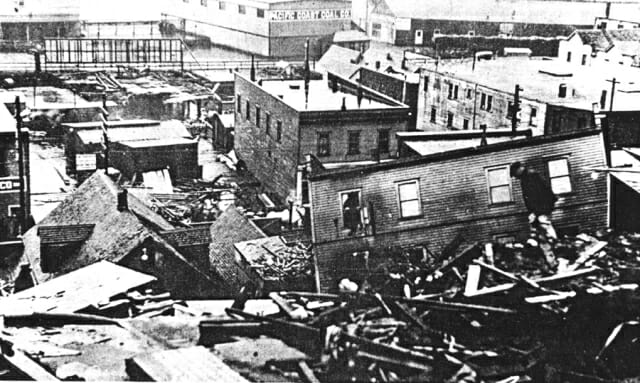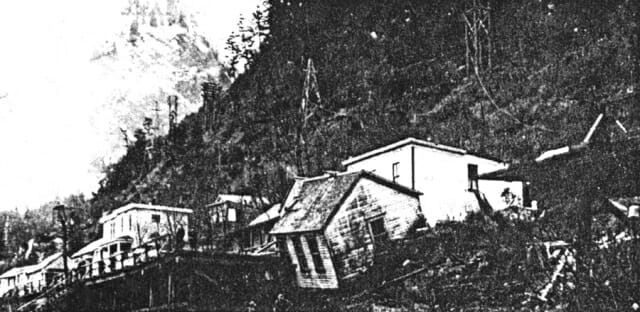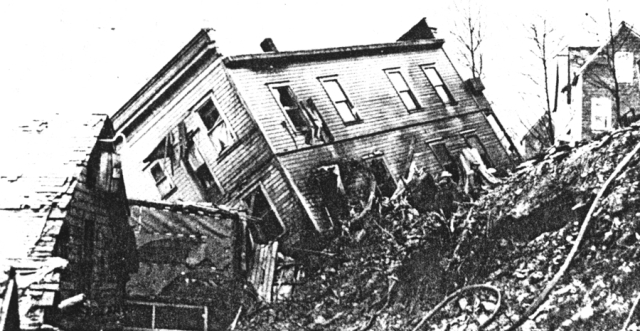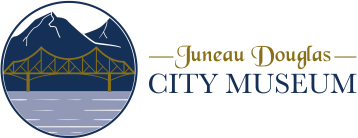Gastineau Channel Memories
Miller, Charlie & Mary
Helen Miller Vacura
My parents, Charlie and Mary Miller, were both immigrants from Yugoslavia and met in Douglas, Alaska. My father came from Montenegro and worked in the mines in Montana before moving on to Alaska, where he lived for the rest of his life. My mother was barely 18 years old when she and her younger sister, Darinka, 16, left their home in Boka Kortorska to join their older brother, Mike Pusich. My grandmother was a widow with seven children to raise, and Uncle Mike came to America with the hope of finding a job whereby he could send money to his mother. He eventually brought his sisters to join him and his wife and family.
My father came to Juneau a few years earlier, perhaps so much as ten. He was 14 years older than my mother. She always said it was ?love at first sight.? I?m told my Uncle Mike was not exactly thrilled since my father was one of those more sophisticated, dapper ?man about town? sorts. They were good friends, however, and Uncle Mike was actually the one who introduced them. My mother met my father in December of 1921; and they were married in January of 1922, something I wasn?t aware of for many years, and I?m sure would have appalled her if one of her daughters were to consider doing such a thing. They were married for 27 years before she passed away.
My parents? first child, a son Alexander was born October 11, 1922; he was followed by four daughters, Helen, Millie, Nellie, and Rosemary. I was born August 11, 1924, at St. Ann?s Hospital in Juneau.
Except when he worked in the mines in Montana, my father was always in business for himself. His last business in Juneau was the Capitol Caf? and Bar. It had the largest dance floor in Juneau, with the exception of the Elks Club. Besides dancing on the weekends for the young singles and couples in town, the Capitol was the ?meeting? place for local politicians who solved most of the city and state affairs at the ?big table,? an extra round table next to the snack bar. Out of those discussions was born my father?s passion for politics. Although he never ran for office himself, he was involved in the election of many of his cohorts. He was a staunch Democrat, thought FDR was next to God (and wept at the news of his death), and Anthony Diamond and Bob Bartlett were his heroes. Charlie Miller died while receiving medical care in Seattle in December of 1950.
My brother, Alex, later followed in my father?s footsteps but to a much larger degree; serving as Democratic National Committeeman, administrative assistant to Governor Egan, and later a state lobbyist. Alex died in 1998, in Anchorage from complications of hearth disease.
Juneau was a wonderful town in which to be raised. I believe it had a population of 7000 when I attended school. No one was a stranger, and we were never fearful of being out at night. Everyone in town walked to school. Cars were not that prevalent. Our family had a car, but I only recall Sunday family drives to the Mendenhall Glacier and Fritz Cove, which were considered long drives, and Thane was considered a short ride. Rarely did people lock their doors, and although we heard of breadlines in the states, if anyone was in need in Juneau all pitched in to help. We also had the dubious practice of ?blue-ticketing? any undesirables out of Juneau. I now wonder who decided someone was undesirable. That was probably not one of Juneau?s greatest attributes, but how do we really know, and I?m certain it was a rare occurrence.
A not-so-fond memory of Juneau was the night our home was destroyed in a landslide. I was only about 4 years old and believe I remember it only because it was so traumatic. I had awakened during the night because the rain was so loud and then the hall light went out and my room tilted at an extreme angle. My brother, sisters and I were on the second floor and the baby was with my mother on the first floor. We had heard my mother scream out (my father was away at work); she had gone to get help because she could not reach us. Apparently, the stairway had broken away. Our house had slid down the hill where it was stopped by a bridge. I don?t recall how we finally got down to the main floor except for help from several men my mother rounded up. We were
carried through the kitchen which had trees, bushes, mud and rushing water throughout the whole room, it seemed. My father was eternally grateful to the Almighty and our good neighbors. Fortunately, my parents did not rebuild there and that was providential as ten years later in 1936, another landslide at the same site engulfed an apartment building and several homes with a loss of lives.
Juneau was a true melting pot of nationalities, including Slavs, Scandinavians, Finns, Filipinos, Asians, etc.; it was a wonderful way to learn about other countries and cultures and become friends. The valedictorian of my high school graduating class was John Tanaka, who was interned shortly after the bombing of Pearl Harbor. Although everyone now realizes this was a terrible injustice, our class knew this in May of 1942; an empty chair was in the midst of our rows of graduates.
We had a great public school system. I recall new students coming into classes and saying it was a lot of ?catching up? to the rest of the students. Some of the teachers I recall were Elma Olson, Miss Monson, Floyd Dryden, Mr. Hauttala, Mr. Roth and Mrs. Council, who quit teaching after she married Dr. Council (which I believe women teachers had to do at that time). In high school, Mr. Dunham was our principal and Mr. Phillips was superintendent. Some of the high school teachers I recall were Majorie Tillotson, Edna Harpole and Phyllis Poulin. Miss Poulin was an outstanding business teacher and was so proud of the ten students who she suggested take the state merit exams and were the top scorers after grading of the tests.
After graduation, I worked in the Territorial Office of Vital Statistics. From there I went to work in the purchasing office of the U. S. Engineers where I met my future husband, Al Vacura. After he was called into the service, I changed jobs again and worked as a secretary in the Territorial Department of Public Welfare under Russel Maynard, Director. I continued working there until I transferred to the local Fairbanks office. My parents and sisters moved to Fairbanks, and I was anxious to follow them and wait for Al to return from the War.
 |
|
 |
|
 |
|
